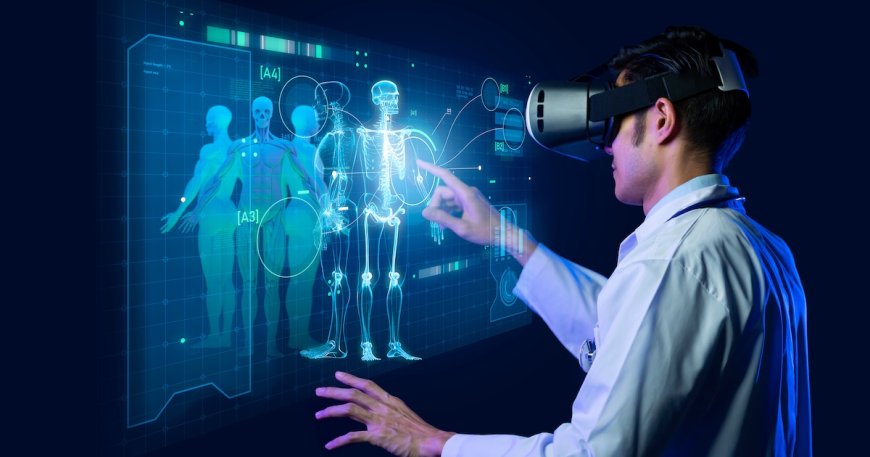AI in Healthcare: Can Machines Outperform Doctors, or Is It Just Hype?
AI is transforming healthcare, from diagnosing diseases to performing surgeries. But can machines truly outperform doctors? Find out in this detailed analysis.

Introduction: The Rise of AI in Medicine
Artificial Intelligence (AI) is transforming industries worldwide, and healthcare is no exception. From detecting diseases faster than doctors to assisting in complex surgeries, AI is becoming a powerful force in medicine. But does this mean machines will replace doctors in the future? Or is AI simply a tool to enhance medical expertise rather than surpass it?
With rapid advancements in machine learning, deep learning, and big data analytics, AI is reshaping how doctors diagnose, treat, and care for patients. But the real question is—can AI truly outperform human doctors? Let’s explore.
How AI Is Changing Healthcare: Breakthroughs and Innovations
1. AI in Diagnosis – Faster and More Accurate Than Doctors?
One of the most promising applications of AI in healthcare is its ability to diagnose diseases quickly and accurately. AI-powered tools, trained on millions of medical records, are now detecting diseases like cancer, diabetes, and neurological disorders earlier than traditional methods.
Examples of AI Outperforming Doctors in Diagnosis
- Cancer Detection: AI-powered imaging tools like Google’s DeepMind and IBM’s Watson Health have shown higher accuracy than human radiologists in detecting breast cancer and lung tumors.
- Eye Diseases: AI-based software like Google's DeepMind AI can detect diabetic retinopathy with an accuracy rate of over 90%, often catching cases that human doctors miss.
- Heart Diseases: AI systems analyzing ECG data can predict heart attacks and strokes before symptoms even appear.
Does This Mean AI Will Replace Doctors?
While AI is improving diagnostic accuracy, it lacks human intuition, experience, and the ability to consider complex emotional and psychological factors in patient care.
2. AI-Powered Surgeries – Can Machines Perform Better Than Surgeons?
Robotic-assisted surgeries, powered by AI, are already being used worldwide. These robotic systems assist human surgeons by improving precision, minimizing risks, and reducing recovery time.
How AI Is Assisting in Surgeries
- Da Vinci Surgical System: A robotic system that allows surgeons to perform minimally invasive surgeries with extreme precision.
- AI-Guided Brain Surgery: AI-powered robots can help in delicate brain surgeries where even the slightest error can be life-threatening.
- Autonomous Surgical Robots: Some AI-driven robots have successfully performed soft tissue surgeries without human intervention, raising questions about whether they can replace human surgeons in the future.
Can AI Completely Replace Surgeons?
While AI-powered robots can enhance surgical precision, they still rely on human guidance. Surgery often involves unexpected complications, and only human surgeons can make complex, real-time decisions in high-risk situations.
3. AI in Personalized Treatment Plans – Better Than Human Doctors?
One of AI’s biggest strengths is its ability to analyze massive amounts of patient data and create highly personalized treatment plans.
Real-Life Applications of AI in Personalized Medicine
- IBM Watson for Oncology: This AI system scans medical literature and patient data to recommend tailored cancer treatments.
- AI in Drug Development: AI is accelerating drug discovery by predicting how different drugs will interact with the body, cutting development time from years to months.
- AI in Mental Health Treatment: AI chatbots like Wysa and Woebot are being used to provide mental health support, showing promising results in anxiety and depression management.
Does AI Make Better Treatment Decisions Than Doctors?
While AI can analyze data faster, it cannot replace human doctors' critical thinking, empathy, and real-time adaptability in patient care. AI is a powerful assistant but not a complete replacement.
Challenges & Limitations of AI in Healthcare
Despite its potential, AI in healthcare still has significant challenges:
- Lack of Human Judgment: AI lacks the intuition, empathy, and ethical reasoning that human doctors bring to medical decision-making.
- Data Privacy Concerns: AI systems require huge amounts of patient data, raising concerns about privacy and security.
- Legal and Ethical Issues: If an AI makes a wrong diagnosis or treatment recommendation, who is responsible—the doctor or the AI developer?
- Bias in AI Algorithms: AI can inherit biases from the data it’s trained on, leading to incorrect or discriminatory diagnoses.
Will AI Replace Doctors? The Final Verdict
AI is undoubtedly revolutionizing medicine, but replacing doctors entirely is unlikely. Instead, AI will act as a powerful tool that enhances doctors’ abilities rather than replacing them.
- AI excels at processing vast amounts of medical data quickly and accurately.
- Human doctors excel at emotional intelligence, ethical decision-making, and real-time problem-solving.
The future of healthcare is not about AI vs. doctors—it’s about how AI and doctors can work together to improve patient outcomes.
Conclusion: AI in Healthcare – A Partner, Not a Replacement
AI in healthcare is advancing at an incredible pace, bringing breakthroughs in diagnosis, surgeries, personalized treatments, and drug discovery. While AI can outperform doctors in specific tasks, it still lacks human experience, ethical judgment, and emotional intelligence—all of which are essential in medicine.
Rather than replacing doctors, AI will serve as a powerful assistant, helping medical professionals provide faster, more accurate, and more efficient care.
What does this mean for patients?
Expect faster diagnoses, better treatment options, and more efficient healthcare systems—but always with a human doctor at the center of care.
What do you think? Can AI replace doctors, or is it just a tool for better healthcare?
What's Your Reaction?
 Like
0
Like
0
 Dislike
0
Dislike
0
 Love
0
Love
0
 Funny
0
Funny
0
 Angry
0
Angry
0
 Sad
0
Sad
0
 Wow
0
Wow
0



















































